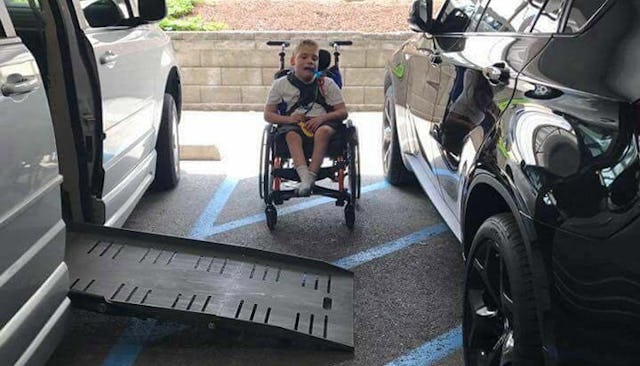Viral Post Shows That We Need To Give Accessible Parking Spots The Space They Require

This is why you should never illegally park in accessible parking zones
It’s not all that difficult to understand why you should never illegally park in accessible parking zones. Yet, time and time again drivers keep doing it — and there are some pretty awful consequences. One police officer shared a photo of a young man who wasn’t able to get back into his car, and it’ll both break your heart and make you very, very angry.
Officer Zack Goins has had enough of people sloppily parking in accessible parking zones. When the police officer spotted a social media post about a young man with a disability who couldn’t get up his ramp because another car was blocking him, he decided to share the picture on Facebook to prove a point.
“I write tickets and tow for that violation frequently, so I thought this picture showed exactly why I do so,” Goins told Scary Mommy.
His post has since garnered more than 200,000 shares, 16,000 likes, and a lot of very, very angry comments. Many are along the lines of “tow that car IMMEDIATELY.” Yup. Do not take up this space. Do not leave your shopping carts there. This zone outside of the space itself is A PART OF THE SPACE. That’s why it’s blue.
Sadly, there’s a whole lot of ignorance surrounding this issue. Goins told The Mighty that drivers have seemed confused when he towed their cars after they illegally parked in an accessible parking zone. Some have also protested citations. Legal issues aside, the police officer just wants people to understand the ramifications of their actions.
“The reason there are laws for accessible parking is for this particular reason. The striped area is specifically for those zones,” Goins explained to The Mighty. “Motorcycles are the worst.”
He also noted that everyday citizens can do their part to stop this illegal behavior. Goins suggested that you can (very politely) approach someone who has parked like this and explain to them that these zones need all of the space included with them. Or you can get in contact with your local precinct. “We will certainly take action,” he said.
For Goins, it’s personal. The police officer has a cousin with cerebral palsy and has experienced the inconsideration of drivers firsthand.
“It set a fire inside me [growing up],” he said. “If we went somewhere and we could not partake in something because of someone’s ignorance of the situation.”
This article was originally published on